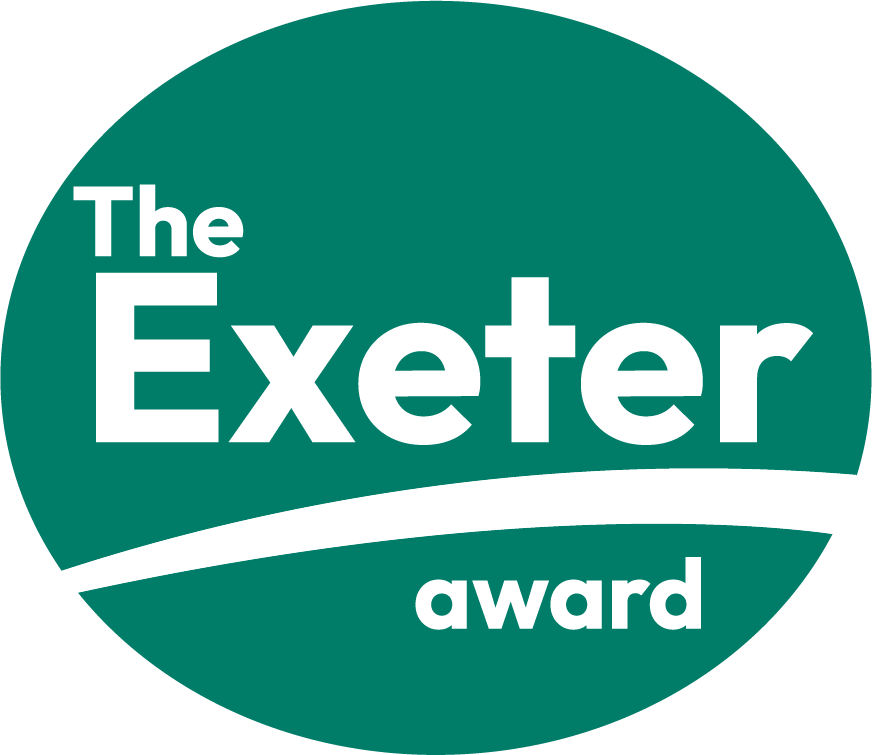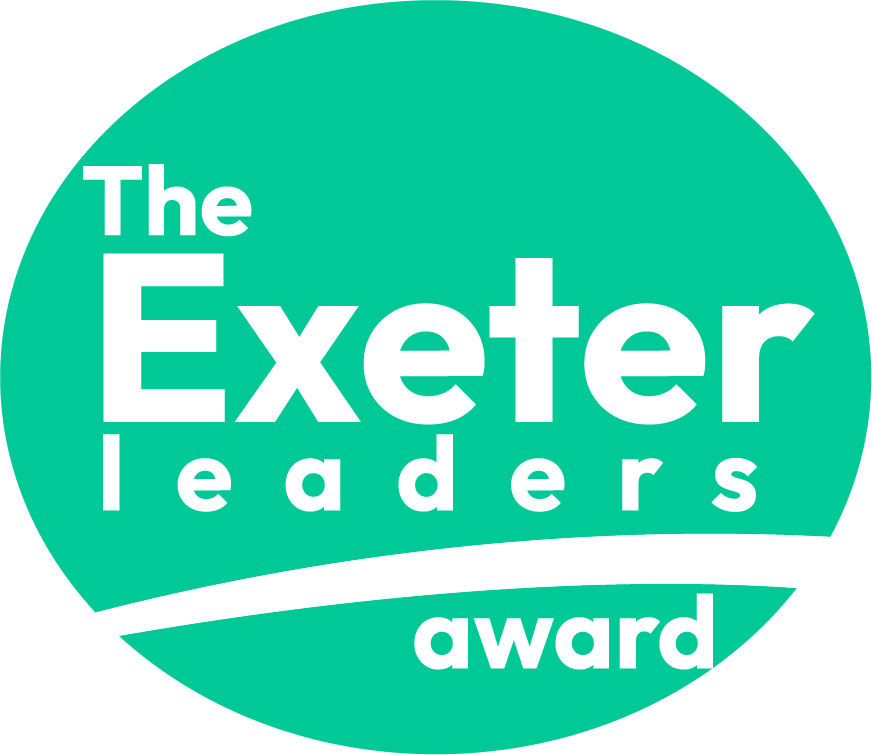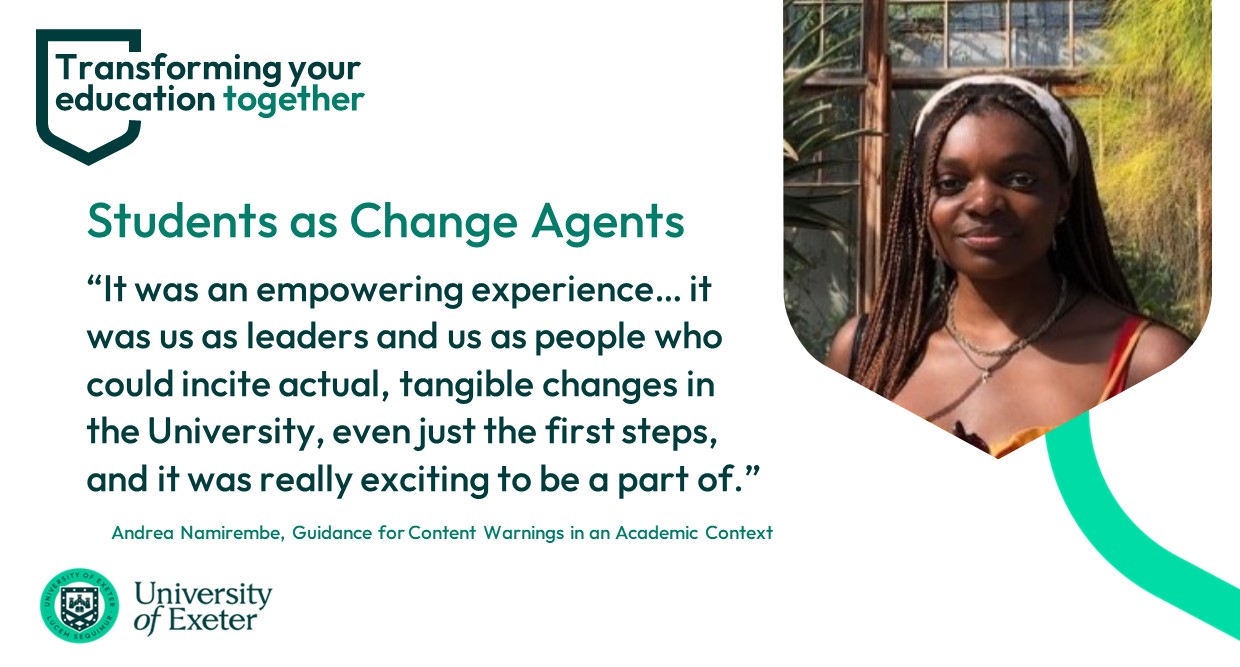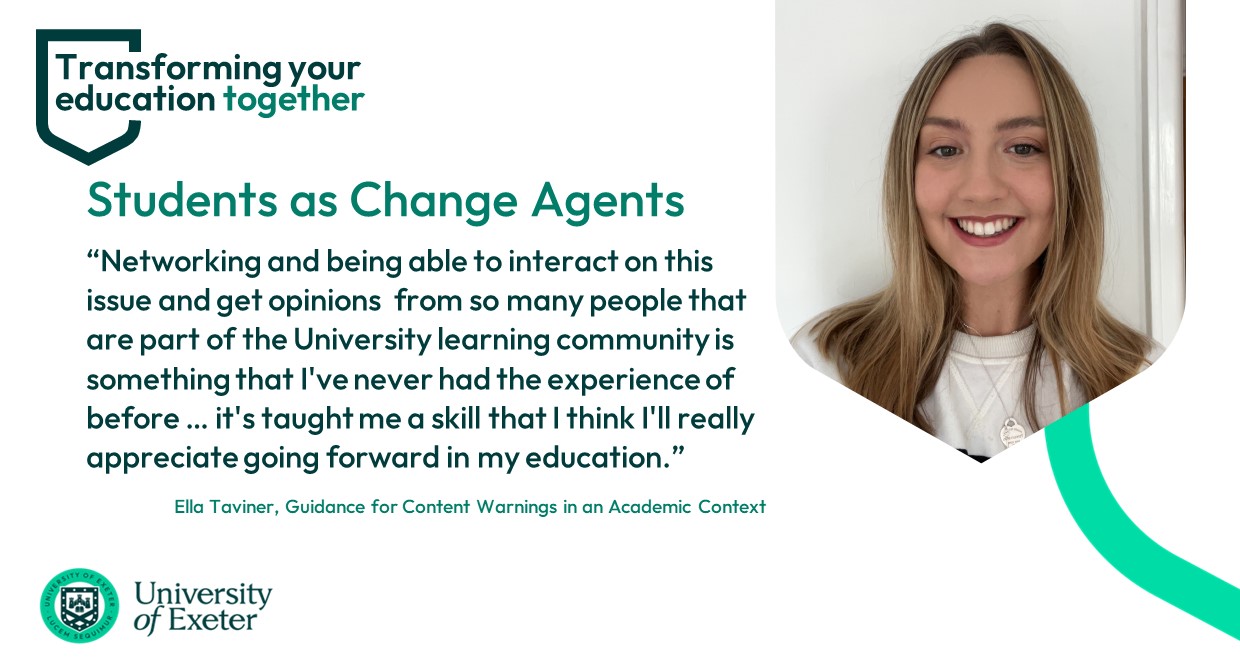Apply to be an intern now

You can count the hours on your project towards the Exeter Award, where you can also access training in relevant personal and professional skills.

If you have already completed the Exeter Award, you can develop your skills further and more specifically within Leadership and Management through the Exeter Leaders Award, using your Change Agents project experience as your case study.
Case Studies
Case Studies
Case Studies
Since Students as Change Agents was introduced at the University in 2008, hundreds of projects have taken place with over 1,000 student leads. Change Agent students tell us overwhelmingly how positive and enriching they find the experience of leading a project, not just in the improvement they help bring to the Exeter student journey, but to the professional skills and experience they gain from leading a project with others.
2023 Funded Projects
Below is a list of summaries for the projects we funded and which ran from April to July 2023.
The aim of this project was to create more points of information and content for both prospective and current BAME and BIPOC university students in order to develop a more inclusive learning and social environment for these students. The co-lead students of this project worked closely with staff to better understand the different experiences of these students. They successfully created social media posts, a YouTube video and a survey aimed at shedding light on the experiences of BAME and BIPOC students at the University of Exeter and the ways in which these students can be support further both academically and pastorally.
This project took approximately 80-85x hours between 3x student co-leads.
“The Power of Precaution” was a project created by History students aimed at creating universal guidance in relation to content warnings in academia. The project sought to facilitate a more inclusive learning environment for both students and staff when handling sensitive material within an academic setting. The students implemented a multitude of creative stations, as well as a discussion panel, to gather perspectives on the power of content warnings and how best to implement this guidance across the university.
This project took around 80-85x hours between 2x student co-leads.
The aim of this project was to increase awareness of gender equality across policy and security-related fields by challenging unconscious biases and promoting a learning environment geared towards gender equality. The student lead laid the framework for increasing female engagement and uptake of traditionally male-dominated subject areas, as well as opening a discussion amongst students and staff on existing biases in this area.
This project took 1x student lead approximately 40x hours.
The CGES Decolonising Project was developed to help support teaching staff to create modules aimed at working towards decolonisation. The student leads aimed to achieve this using feedback from students and staff to enable critical reflection on teaching practice and the development of a CGES Decolonising Action Plan. Using cross-fertilisation of resources, they created surveys for both staff and students surrounding this idea and received high quality qualitative data as a result. The project succeeded in creating a foundation for positive change regarding decolonisation within Geography at the University of Exeter.
This project took approximately 115-125x hours between 4x student co-leads.
This project was created to contribute to the university’s “Success for All Education Strategy” by working to establish a peer-led support group for students with ADHD. The student co-leads designed a questionnaire for students which provided high-quality data on this matter that can be used to help inform future work to support UoE students with ADHD. The student co-leads also maintained frequent communication with both Wellbeing and Accessibility, who provided advice and assistance. An ADHD peer support group was officially registered with the Students’ Guild; it is set up for the 2023-2024 academic year as a student group within the Guild’s processes.
This project took 2x student co-leads approximately 50-55x hours.
The Work Abroad Support Programme (WASP) was established to provide improved support for students preparing to undertake their Work Abroad year during their studies. The student lead worked closely with staff to create promotional materials such as a blog and poster, as well as forming a WASP SharePoint guide for students undertaking their Work Abroad year. WASP has laid the foundations for further guidance and support for Work Abroad students, from information surround visa applications to creating more robust channels of communication between staff and students.
This project took 1x student lead approximately 27x hours.
The CareerZone Project centred around reviewing the inclusivity and accessibility of the CareerZone in both a physical and digital sense to maximise access for all. The student co-leads identified recurring themes which affected accessibility, inclusivity and the representation of diverse identities. The project sought feedback from students on this matter and collected invaluable data surrounding the current accessibility of the CareerZone’s resources. From this feedback, the student co-leads have created a foundation for developing a more accessible approach to the physical and digital resources maintained by the CareerZone.
This project took approximately 140-145x hours between 3x student co-leads.
The focus of this project was to increase student engagement in academic representation and enable more effective collaboration when discussing broad issues such as social injustice and climate matters. The project investigated the university processes surrounding academic representation to gain a better understanding of how grassroots initiatives, particularly those from the discourse around deliberative democracies, can provide a positive impact on current methods. The student lead conducted interviews with students from the People’s Assembly community and “Be the Change” society, which provided invaluable insight into the benefits and limitations of the current format of the People’s Assembly.
This project took 1x student lead approximately 80-85x hours.
Previous Projects
Below is a broader snapshot of other successful projects we have supported over the last several years.
Students from the College of Medicine and Health created a website resource titled, ‘Professional Portfolio Development Opportunities’. This is a website which allows CMH students to develop their professional skills, do networking, and share experiences with other students.
Opportunities that students are given throughout the course of study, such as internships, short term placements and the Professional Training Year placements can be difficult to get onto. On this student-led website, there are examples of such opportunities and guidance on securing them. Students have often asked what they can do after their degree, and on this website, they can now find testimonials from alumni about their career path or postgraduate training, allowing students to see the vast opportunities that can come from their degrees.
Exeter BAME Law helped BAME and International students feel part of the Exeter community, by helping to increase inclusivity, equality and diversity. Another aim was to develop awareness of the need for equal career opportunities. This group worked directly with the university to ensure resources were available to improve responses for combatting discrimination and racism on campus. Through creating social media accounts, they were also able to raise awareness and signpost students to well-being facilities, such as the new Exeter Speaks out service. Through running events, a small mentorship scheme, and being part of the Provost Commission, Exeter BAME Law received brilliant feedback from students who learnt a lot from their project.
LGBTQ+ and Law was a student-led legal diversity initiative that aimed to help and guide LGBTQ+ students who are interested in pursuing a legal career. In 2020/21, they held events and workshops, as well as networking opportunities with other LGBTQ+ legal professionals. They also held events with Robin White from Old Square Chambers, Dentons, and The Law Society of England and Wales.
The Diplomatic Hub aimed to create an interdisciplinary forum for students interested in international affairs and diplomacy. They organised a variety of events including talks from His Excellency Simon Mustard, British Commissioner to Sierra Leone; former BBC Diplomatic Correspondent Jonathon Marcus; and His Excellency Simon Boydon, British Ambassador to Mauritania. DipHub also ran their own termly student journal for diplomacy and world politics – The Diplomatic Post. The project has aspired to equip students with the necessary tools to understand the dynamics of international affairs and go beyond the syllabus to truly explore the field.
Following the success of an extended pilot project to test its impact through Change Agents, Diplomatic Hub continues to run as an active society affiliated with the University of Exeter Students' Guild.
The Undergraduate Science Journal was created to enable accessibility of undergraduate research and enrich conversation between students about up-and-coming scientific research. It has worked to showcase the research from undergraduate scientists and allow students to be published in a peer reviews journal before their graduation. The group of students responsible for this project created both physical and online copies and also hosted an annual undergraduate STEM conference.
The Holocaust Memorial Conference project ran for 4 years and has raised awareness of the Holocaust and how the present society could learn from it to promote a society, without racism, discrimination and hatred. Over previous years, conferences have been held to mark the Holocaust Memorial Day, bringing together university students with students from schools and sixth forms in the Southwest. At such conferences, students have heard from Holocaust survivor Mala Tribich MBE, Dr Noemie Lopian, the daughter of Holocaust survivors, and Derek Niemann, the grandson of an SS officer, to name a few. Students also took part in workshops led by academics and external experts. These workshops gave students a much more personal and deeper understanding of the Holocaust.
The aim of the student-led project ‘Missing Maps’ was to make students aware of the work charities such as the British Red Cross do and how Exeter students could make a difference. The project sought to make a substantial contribution in mapping locations that were in need and encourage students to help. They held 2-3 fundraising marathons a term for students to get involved in, spread news about upcoming events, and also organised themed events in which academic staff got involved.
The student founders of Global Exe aimed for the project to encourage people to learn about the diverse cultures at The University of Exeter and empower individuals through interactive Forum Theatre performances. This has created a safe space for students to engage in difficult conversations. Audiences would be presented with an oppressive scenario and were invited to replace actors to try and create a positive outcome. Global Exe participants had greater confidence in dealing with conflict after attending these events.
The Inspiring Spaces Art Project aimed to showcase the collaboration between students and staff in art form at St Luke’s. The proposed sculpture was erected and transformed the foyer of the Medical School Building. Students from differing courses all co-created the art piece and also collated images showing the process of making it, and other achievements of the students too. The sculpture and the space serve an educational purpose and inspire students who see it.
Students from The Medical School have run Undergraduate Student Conferences and successfully invited external speakers, students and academic staff to full days of workshops, debates and talks. Attendees were able to learn more about Medical Sciences final year research projects and professional training years and also INSPIRE projects. During this conference, they held a poster competition, showcasing research students have completed. It was a great chance for students to learn from each other and academics and find out more about the sector.
The MA Translation Alumni Round Table was an event created to provide current Exeter students with the opportunity to network with alumni who have previously taken MA Translation. A range of alumni were present: a literary translator, freelance specialist translators and a project manager. The event allowed students to speak one on one with alumni, meaning students could learn from them and gain ideas about how they could progress professionally.




